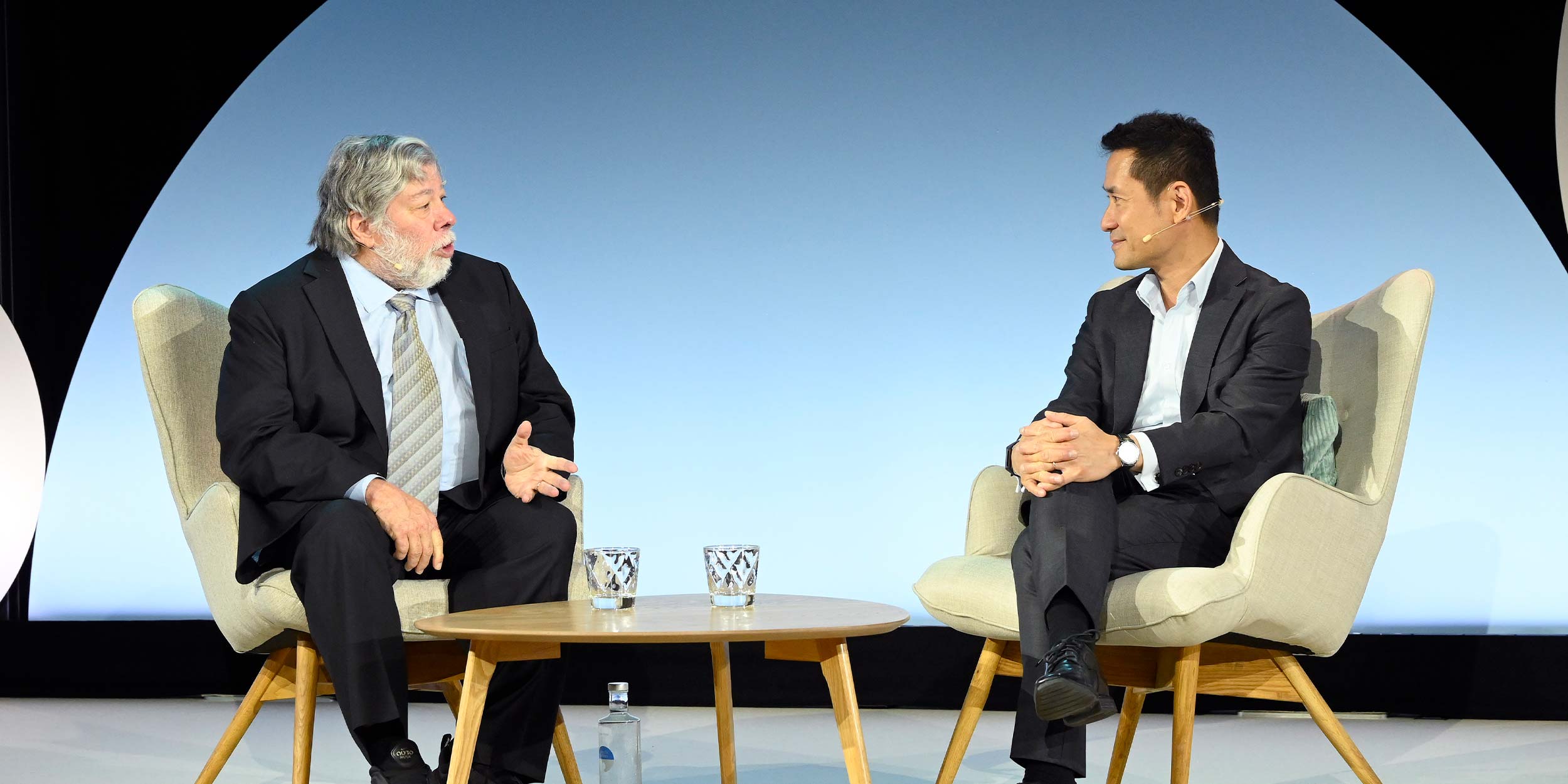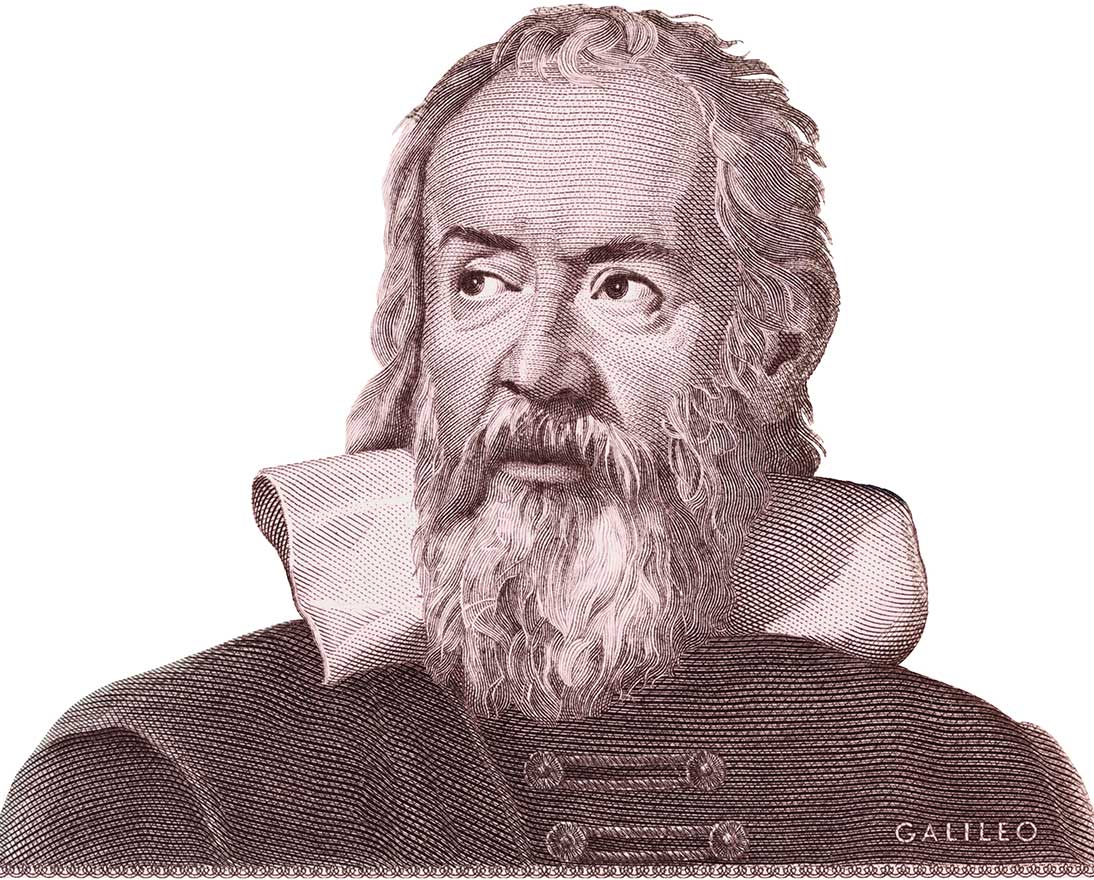When Steve Wozniak speaks, people listen
PeopleArticleJanuary 5, 202315 min read
Steve Wozniak co-founded Apple and created the groundbreaking Apple II home computer. He was the star of our latest Zurich Talks on Future Innovation and delighted the audience with his enthusiasm, intellect and humor – and doled out, as he always has, words to live by.
Earlier this year, on the podcast “Wild Ride!” hosted by the comedian Steve-O, another Steve – Steve Wozniak – was described as “the single most culturally significant person alive today.” If it sounds, well, wildly over-the-top, especially given the source, think again. Wozniak, the featured guest in our latest Zurich Talks centered around Future Innovation, co-founded Apple but more specifically, and significantly, engineered and designed the Apple II in 1977, the first widely-used personal computer, which laid the groundwork for — there’s no other way to say it – a revolution.
As Macworld put it more soberly two years ago: “If any single person could lay claim to being the architect of the modern home computer as we know it, it would be Steve Wozniak.” Woz, as he’s affectionately known, enthralled our packed auditorium at Quai Zurich Campus with an almost child-like enthusiasm that was irrepressible. “Go to sleep dreaming and wake up in the middle of the night with a solution,” was just one of the inspiring pearls he shared with interviewer Ericson Chan, Zurich’s Group Chief Information and Digital Officer (pictured above). “Life is about happiness,” he added. “How happy are you? How many good times do you have?” And finally: “All I can say is believe in yourself.”
Woz is a genius and, sure, you could indeed call him “the single most culturally significant person alive today,” but he’s also part nerd (his word), part raconteur, part prankster and part California showman – he was, no joke, on Dancing with the Stars in 2009. He’s also been a schoolteacher, philanthropist and all-around decent human being. Seth Rogen, who portrayed Woz in the 2015 movie Steve Jobs, described him to Variety as “immensely lovable,” “sweet, compassionate, caring” and “the kind of guy you want to give a hug to.”
Throughout his career – in numerous interviews and in iWoz: Computer Geek to Cult Icon, his memoir written with Gina Smith – Wozniak has always been a fount of knowledge and wisdom, whether speaking on subjects like innovation and entrepreneurship, the importance of honesty, or Star Trek and The Big Bang Theory. Think of them as aphorisms by Woz or, as we like to think of them, Woz-isms. We compiled a list of some of our favorites:
On his dad:
Jerry Wozniak was an engineer for Lockheed and raised his family in San Jose, California – in the years when Silicon Valley was still known as the Santa Clara Valley. He imparted the virtues of truth and engineering (and truth in engineering) in his son at a young age.
“My dad believed in honesty. Extreme honesty. Extreme ethics, really. That’s the biggest thing he taught me….I never lie, even to this day. Not even a little.” –iWoz
“My dad had the opinion that change is what moves the world forward and that’s the path we’re on and basically all change is good.” –iWoz
“The main ethic I’d gotten from my dad and the ethic he ingrained in me was logic. Logic was the thing. I decided that the most important measure of a person was truth, and that the calculations engineers made were the mark of people who lived truthfully.” –iWoz
On Steve Jobs and Apple:
No matter how much Woz has accomplished, and will continue to accomplish, he’ll always be linked to the larger-than-life Steve Jobs, with whom he co-founded Apple. He and Jobs each had 45 percent in the original company, and their third partner, Ron Wayne, had 10 percent.
“Steve [Jobs] and I were the best of friends for a very, very long time. We had the same goals for a while. They jelled perfectly at forming Apple. But we were always different people, different people right from the start.” –iWoz
“Simplicity is a mainstay of Apple, and it really does come to both of us. Steve Jobs was only known because he was being publicized, but even long before computers, he knew that I always talked about, ‘If I design things with fewer parts, it’s easier to understand, it’s easier to build, and it works more reliably.’ It takes a lot of knowledge and a lot of work to do that, but the idea of simplicity we spoke about....and it really came from both of us, not just one.” –Woz.org
“A good leader has to spot the talented resources, the best people to do the different jobs – and the right products, the right direction to go – so he [Steve Jobs] was the direction setter, and he just knew I was the best at what I did.” –Interview with Patrick Bet-David, March 2019
“So much of the information out there about me is wrong. I’ve come to hate books about Apple and its history so much because of that. For instance, there are stories that I dropped out of college (I didn’t) or that I was thrown out of the University of Colorado (I wasn’t), that Steve and I were high school classmates (we were several years apart in school) and that Steve and I engineered those first computers together (I did them alone).” –iWoz
“I learned a lot of things at Apple those first few years….One thing I learned directly from this new experience of creating and working at a company with so many different people is: Hey, never pretend you can do someone’s job better than someone who’s been doing it for years.” –iWoz
On innovation, engineering and entrepreneurship:
With Woz, it begins and ends with innovation. But his wise advice can be used to succeed in almost any field.
“For me, it’s the engineering, not the glory, that’s really important.” –iWoz
“When you get your own ideas and you want to build something for yourself, your personal idea, maybe it’s just for fun in your own life, it’s not even for the world, not for a company necessarily, that’s how you educate yourself. Motivation is worth a lot more than knowledge.” –Interview with Prof. Alan Brown
“Start out with tiny projects that aren’t worth any money in the world, but that’s how you develop your brain and that’s how you learn. Every project you work on in your life – I just look at my own life as an example – is the prior project and a little better and a little more. And every technique you come up with for doing things better you keep forever in your head.” –Interview with Prof. Alan Brown
“If you read the same things as others and say the same things they say, then you’re perceived as intelligent. I’m a bit more independent and radical and consider intelligence the ability to think about matters on your own and ask a lot of skeptical questions to get at the real truth, not just what you’re told it is.” –iWoz
“I think randomness and even a little misbehavior is really essential to creative people.” –Interview with Patrick Bet-David, March 2019
“There was a lot of talk about our being part of a revolution. How people lived and communicated was going to be changed by us, changed forever, changed more than anyone could predict….But back then, even we had no idea how right we were and how it would become.” –iWoz
“This much I know for sure: I was meant to be an engineer who designs computers, an engineer who writes software, an engineer who tells jokes and an engineer who teaches other people things.” –iWoz
“I was sure, even at 22, that I didn’t want to switch from engineering to management, ever. I didn’t want to go into management and to fight political battles and take sides and step on people’s toes and all that stuff.” –iWoz
“You need to believe in yourself. Don’t waver. There will be people – and I’m talking about the vast majority of people, practically everybody you’ll ever meet – who just think in black-and-white terms. Most people see things the way the media sees them or the way their friends see them, and they think if they’re right, everyone else is wrong. So a new idea – a revolutionary new product or product feature – won’t be understandable to most people because they see things so black and white. Maybe they don’t get it because they can’t imagine it….Don’t let these people get you down.” –iWoz
“As an inventor, you have to see things in gray scale. You need to be open. You can’t follow the crowd. Forget the crowd. And you need the kind of objectivity that makes you forget everything you’ve heard, clear the table, and do a factual study like a scientist would.” –iWoz
“The only way to come up with something new – something world-changing – is to think outside of the constraints everyone else has.” –iWoz
“Most inventors and engineers I’ve met are like me – they’re shy and they live in their heads. They’re almost like artists. In fact, the very best of them are artists. And artists work best alone – best outside of corporate environments, best where they can control an invention’s design without a lot of other people designing it for marketing or some other committee. I don’t believe anything revolutionary has ever been invented by committee. Because the committee would never agree on it!” –iWoz
“I think there’s a time in everyone’s life when you look back and ask yourself, What else could I have been? What else could I have done? With me there’s just no question about the answer, none at all.” –iWoz
On the importance of teachers:
Primary school meant everything to a young Woz – and he found a way to give back.
“I told my dad, I’m going to be an engineer first and a fifth-grade teacher second….All through school and my life, I knew that teachers were so important. Engineers got paid higher, my dad said, but I still wanted to have some way of teaching….I taught for eight years secretly because I didn’t want press near the kids. A lot of people don’t know I did that, but it was in my heart. It’s easy when you have money to give computers to schools. A lot of people do that. But your time is a lot more precious than money. And if you give your own time that means you really believed in it.” –Interview with Prof. Alan Brown
“The things I learned in my years as a teacher, well, they’re just too numerous to count. I felt this was the most important time in my life.” –iWoz
“Back in the mid-1990s when I was teaching school, I thought one time to myself, Wow, I wish I could be 12 now, look at the things I could do with what’s out there now.” –iWoz
On Star Trek and hippies:
Woz was born in 1950, and like so many of his generation, the original Star Trek series, which aired from 1966–69, left a big impression, as did the hippie movement.
“Star Trek had done so much for me. I’m not sure I would’ve had the inspiration that I had to ever start Apple and do all these technical things, and I don’t think I would’ve had the meaning in my life if I hadn’t gone to Star Trek conventions when I was young.” –The Huffington Post, April 19, 2017
“Let me tell you, I was never a hippie. I tried to be a hippie, but I could never be what they were – not in high school or even in college when all that protest stuff was going on. I’d try to hang out with hippies because I stood with them politically, but they’d usually ask me to leave because I wouldn’t use drugs.” –iWoz
On money:
Let’s be clear: Steve Wozniak has done more than OK for himself financially, and justifiably so, but he could have a lot more in the bank if money was a driving force for him.
“I do not invest. I don’t do that stuff. I didn’t want to be near money, because it could corrupt your values.” –Fortune, April 21, 2017
“I don’t want to be big money, I really don’t. I didn’t want to run companies and tell other people what to do. I was too much of a nice guy that I would probably get kicked out really quickly. I wanted to design computers.” –Interview with Patrick Bet-David, March 2019
“When you have no money, no bank accounts, no rich relatives, that’s how you have to think: ‘What can we do today with what we have.’ And that was our start.” –Interview with Wild Ride with Steve-O
“I like to do things different. I valued the employees at Apple – there were more than a hundred by then – as a community….So I decided it would be better to sell some of my stock to employees and let them benefit, rather than some outside investor. It was apparent to a lot of people at this point that Apple was going to have a very successful IPO…and top executives and founders at Apple had a lot of stock. We were all likely to make millions. But a lot of other employees were left out, the majority of them. I decided I was going to offer to sell some stock really cheap to people who deserved it. Regular employees didn’t get all the stock options executives got. Which wasn’t fair. So I came up with something I called the Woz Plan. Any engineer or marketing person could buy 2,000 shares from me at a really low price of $5. Almost everybody who participated in the Woz Plan ended up being able to buy a house and become relatively comfortable. I’m glad of that.” –iWoz
“It very much bothered me that you can get away with all kinds of things when you are successful. For example, a bad person can get away with a lot of things if they have a lot of money. And a bad person can hide it – hide behind the money – and keep being a bad person.” –iWoz
On fun:
Despite being a brainiac, good humor – and a good prank – has always been a hallmark for Wozniak. He even used the pseudonym “Rocky Raccoon Clark,” and at his university no less, to keep from being recognized.
“I did take work seriously – I had engineered a fantastic product, and everyone knew it – and I was serious about starting a company and introducing a product. But to me, that goes along with having fun and playing jokes. I’d spent my whole life like that. If you think about it, even a lot of the personality of the Apple computer was about fun. And that really came about just because my style was to have fun. Jokes make things worth doing.” –iWoz
“I know a lot of people will probably be reading this book only because I started Apple. But what I wish more people knew about me is what I think I should really be famous for: creating the very first Dial-a-Joke in the Bay Area, which was one of the first in the world.” –iWoz
On music, dancing and TV:
Besides appearing on Dancing with the Stars – where he actually did “the worm,” broke his toe and pulled his hamstring – Woz also had a cameo on The Big Bang Theory in 2010. Before that, he was known to rub elbows with rock stars. In 1981, Emmylou Harris sang at his wedding, and over the next couple of years he organized the US Festival, two massive outdoor rock concerts in Southern California that included the likes of Fleetwood Mac, Santana, the Police, Pat Benatar and virtually anyone who was anyone in rock back then. In addition to Seth Rogen, he was portrayed a second time on the big screen in 2013’s Jobs, this time by Josh Gad.
“When Dancing with the Stars called, I said ‘What the heck is that?’ I’d never seen dancing in my life. I was the most outsider there could be.” –At NCR Synergy, 2013
“I fell in love with The Big Bang Theory. It’s all about how I grew up, too. Very much a nerd, very much unable to converse with people in a normal sense….It was really nice to go down there and meet the cast.” –At NCR Synergy, 2013
“If I compare the US Festival to starting Apple, there’s a huge difference. With Apple, I designed those computers alone. I could make every decision by myself. But with the US Festival, I had to deal with all kinds of people and lawyers. And let me tell you, in my experience, the music industry is the worst of all.” –iWoz
And the perfect quote to end on:
“I hope you'll be as lucky as I am. The world needs inventors – great ones. You can be one. If you love what you do and are willing to do what it takes, it’s within your reach. And it’ll be worth every minute you spend alone at night, thinking about what it is you want to design or build. It’ll be worth it, I promise.” –iWoz




